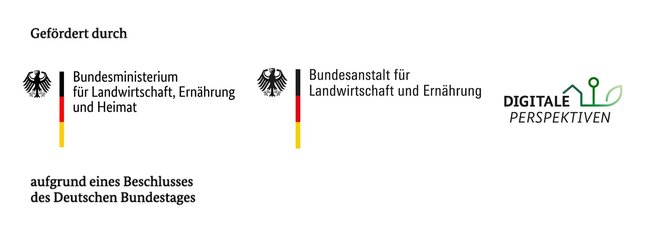Das Programm der KIDA-KON 2025
| ZEIT | PROGRAMM |
| 09:00 | Registrierung & Thünen-Führung |
| 10:00 | Begrüßung |
| 10:30 | Ghost in the machine: applying corpus AI to risk assessment. Paul Devalier | European Food Safety Authority |
| 11:10 | Kaffeepause |
| Session 1 | LLM applications in food & health risk assessment (Chair: Jacob Schmieder) | |
| 11:40 | Information extraction for mechanistic toxicology using LLMs Aileen Bahl | Bundesinstitut für Risikobewertung |
| 12:00 | Implementation of AI-based support systems in the risk assessment of recipient and donor organisms for genetic engineering operations André Friedrich | Bundesamt für Verbraucherschutz und Lebensmittelsicherheit |
| 12:20 | Mittagspause |
| 13:40 | Postersession |
| 14:40 | Kaffeepause |
| Session 2 | AI and remote sensing in agriculture (Chair: Dr. Janis Stiegeler) | |
| 15:10 | Advancing landscape monitoring: a modular and scalable ML framework for woody vegetation identification with remote sensing data Jennifer McClelland | Julius Kühn-Institut |
| 15:30 | Semantic segmentation of multitemporal very high-resolution satellite imagery for nation-wide hedgerow identification Lukas Blickensdörfer | Thünen-Institut |
| 15:50 | Earth observation and deep learning for area-wide mapping of agricultural land use and habitat diversity in Germany Gideon Okpoti Tetteh | Thünen-Institut |
| 16:10 | Challenges of AI-based methods for spot- / site-specific spraying Stefan Paulus | Institut für Zuckerrübenforschung |
| 16:30 | Kaffeepause |
| Podiumsdiskussion: Mit KI gegen Verluste und Abfälle bei Lebensmitteln | |
| 17:00 | Prof. Dr. Birgit Kleinschmit | Thünen-Institut Prof. Dr. Engel Arkenau | Bundesministerium für Landwirtschaft, Ernährung und Heimat |
| 18:30 | Abendprogramm |
| ZEIT | PROGRAMM |
| 09:00 | Data governance and data sovereignty for environmental data Prof. Dr. Ina Schiering | Ostfalia Hochschule für Angewandte Wissenschaften |
| Session 3 | Predictive modeling in economics and trade (Chair: Dr. Steffen Albrecht) | |
| 09:45 | Predicting volatile energy prices Annemarie Kronhardt | Deutsches Biomasseforschungszentrum |
| 10:05 | An evaluation of gravity models and artificial neuronal networks on bilateral trade flows in wood markets Christian Morland | Thünen-Institut |
| 10:25 | Kaffeepause |
| 10:55 | Posterpreisverleihung |
| Session 4 | Environmental monitoring (Chair: Tatjana Manych) | |
| 11:05 | Towards reliable soil horizon classification: a multimodal approach leveraging hierarchical taxonomy and graph-based representations Teodor Chiaburu | Berliner Hochschule für Technik |
| 11:25 | Efficient seasonal hydrological prediction with hydracastAI David Mengen | Forschungszentrum Juelich |
| 11:45 | Ground-truthing of satellite-based forest condition products using precise tree positions Amelie McKenna | Thünen-Institut |
| 12:05 | From study areas to a nationwide forest monitoring: roll-out in germany in progress Jonathan Wolf | Thünen-Institut |
| 12:25 | Mittagspause |
| Session 5 | AI for livestock & marine populations (Chair: Dr. Aileen Bahl) | |
| 13:30 | Detection of common starfish in underwater images from Sylt outer reef using YOLOv8 Carsten Meyer | Ostfalia Hochschule für Angewandte Wissenschaften |
| 13:50 | AlphaFold-driven structural optimization of ligninase for enhanced lignocellulose degradation in transgenic livestock Aseem Tara | Friedrich-Loeffler-Institut |
| 14:10 | Smart farming in action: evaluating AI weight sensors for health and profitability in pig production Mavis Boimah | Thünen-Institut |
| 14:30 | Verabschiedung |
| 15:00 | Ende der Veranstaltung |
Ergänzend zum Vortragsprogramm werden auf der KIDA-KON 2025 zahlreiche Poster mit inspirierenden Inhalten zu sehen sein. Die Posterausstellung findet in den Veranstaltungsräumlichkeiten statt. Die Posterausstellenden möchten mit den Teilnehmenden ins Gespräch kommen und sich zu den Inhalten austauschen. Folgende Poster werden ausgestellt:
| Poster-nummer | Postertitel | Posterreferent*In |
| 01 | AI-Assisted Derivation of Agronomically Relevant, Small-Scale Soil Information Using an Integrated Soil Sensor System, Satellite and Drone Image Data, and additional Geodata | Niels Lakämper |
| 02 | Inforcement Learning in human and veterinary medicine – a systematic review | Deliah Tamsyn Winterfeld |
| 03 | A Gamification-Based Approach for Stakeholder Engagement using Artificial Intelligence | Alia Spode |
| 04 | Numerical Information Field Theory for Acoustic Monitoring | Jacob Schmieder |
| 05 | Harnessing Machine Learning for Multi-Scale Soil Health Insights: From National Mapping to Continental Trends | Ali Sakhaee |
| 06 | How data-driven space-for-time approaches can help to estimate long-term effects of humans on soil health | Florian Schneider |
| 07 | Digital Twins for the Environment – An Example for the Maschsee | Christoph Manß |
| 08 | Digitalization and Automation of Technical Infrastructure in Biorefineries Research | Isis Paola Núñez Franco |
| 9 | Does implementation of machine learning algorithms in land use modelling enhance allocation accuracy? | Simon Thomsen |
| 10 | An ontology for classifying biogenic residues in Germany | Kim Schmidt |
| 11 | Leveraging Sentinel-1 SAR and AI for High-Resolution Crop Phenology Monitoring | Tanja Riedel |
| 12 | BETTER-WEEDS | Martin Rabe |
| 13 | How can a machine-learning system be trained to distinguish between softwoods even though the characteristics are particularly similar? | Jördis Sieburg-Rockel |
| 14 | In the beginning there was complex data… | Fabian Billenkamp |
| 15 | AI consulting for federal institutes with KIDA: Highlighting two projects | Marko Henning |
| 16 | Concept and implementation of a mobile data acquisition system for obtaining research data | Kerstin Wurdinger |
| 17 | Enhancing Human-Machine Interaction Towards More Effective and Practical AI-based Otolith Analyses | Arjay Cayetano |
| 18 | Vegetation indices and wavelengths selection to detect pest symptoms on tomato leaves | Yukiko Nakamura |
| 19 | Self-Supervised Learning for European-Scale Crop Classification Using the LUCAS Dataset | Stefan Stiller |
| 20 | AI for Sustainable Agriculture: Improving Animal Welfare with Computer Vision and Object Detection | Hamid Mousavi |
Nach oben







